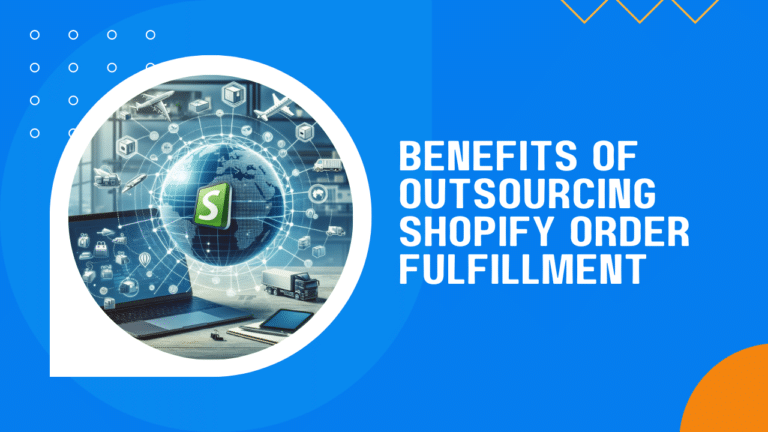Ecommerce has revolutionized the way we shop and sell, growing exponentially in recent years. Central to this transformation is Shopify, a leading platform that empowers businesses to build their online presence. However, as these online stores flourish, they encounter a critical challenge: efficiently managing order fulfillment.
Order fulfillment – the process from receiving an order to delivering it to the customer – is a cornerstone of ecommerce success. For many Shopify store owners, handling this in-house can be overwhelming, especially with the complexities of inventory management, packaging, and shipping. This is where the concept of outsourcing order fulfillment comes into play.
Outsourcing offers a solution to the intricate puzzle of ecommerce logistics. For Shopify stores, this could mean the difference between a struggling operation and a thriving business.
The 7 benefits of outsourcing Shopify order fulfillment that we will dive into later in this article are:
- Cost Efficiency
- Scalability
- Expertise and Experience
- Focus on Core Business Activities
- Technology and Infrastructure
- Flexibility and Risk Management
- Global Reach
We will explore how outsourcing Shopify order fulfillment not only alleviates the burden of logistical challenges but also enhances business efficiency and customer satisfaction. Whether you’re a burgeoning Shopify store or an established player, understanding these benefits can be pivotal in your ecommerce journey.
Understanding Shopify Order Fulfillment
For ecommerce stores, efficient order fulfillment is not just a logistical requirement; it’s a crucial part of customer satisfaction and business success. For Shopify store owners, understanding the nuances of this process is fundamental.
What is Order Fulfillment in the Shopify Context?
Order fulfillment within the Shopify ecosystem involves several key steps: receiving orders, processing them, storing inventory, picking and packing products, and finally shipping them to customers. This process is the backbone of any Shopify store’s operations, directly impacting customer experience and brand reputation.
Challenges in Shopify Order Fulfillment
Managing order fulfillment in-house can be a complex endeavor. The challenges are multi-fold:
- Inventory Management: Keeping track of stock levels, especially for stores with a wide range of products, can be daunting.
- Shipping and Handling: Determining the most cost-effective and efficient shipping methods requires expertise and can vary significantly based on the product and destination.
- Customer Expectations: Today’s consumers expect fast, accurate, and hassle-free delivery, which can be a tall order for small to medium-sized businesses.
- Scalability: As a business grows, so does the volume of orders, making it increasingly difficult to maintain the same level of efficiency and customer service.
- Return Management: Handling returns and exchanges seamlessly is another aspect that can consume considerable time and resources.
These challenges highlight why many Shopify store owners are turning to outsource their order fulfillment. It’s not just about offloading a task; it’s about enhancing efficiency, scalability, and customer satisfaction.
Benefits of Outsourcing Shopify Order Fulfillment
Outsourcing the order fulfillment process can offer numerous advantages for Shopify store owners. This strategic decision not only addresses the complexities associated with ecommerce logistics but also adds significant value to the business.
1. Cost Efficiency
- Reduced Operational Expenses: Outsourcing eliminates the need for investment in warehouse space, staff, and logistics technology, translating into lower overhead costs.
- Economies of Scale: Fulfillment partners can offer reduced shipping rates due to their volume of operations, which individual stores may not be able to achieve independently.
2. Scalability
- Flexibility with Business Growth: Outsourced fulfillment services can easily adapt to fluctuating order volumes, supporting both peak seasons and periods of rapid business growth without the need for additional resource investment.
- Seamless Expansion Opportunities: For businesses looking to expand into new markets, fulfillment partners often have the infrastructure and expertise to facilitate this expansion more smoothly.
3. Expertise and Experience
- Professional Order Management: Fulfillment companies bring years of expertise in logistics, ensuring efficient and accurate order processing.
- Enhanced Customer Experience: With professional handling, packaging, and shipping, customers receive their orders promptly and in excellent condition, fostering positive customer experiences and loyalty.
4. Focus on Core Business Activities
- Allocation of Resources: By outsourcing fulfillment, store owners can redirect their focus and resources towards marketing, product development, and other core business activities.
- Reduced Administrative Burden: The logistical intricacies and administrative tasks of order fulfillment are managed by the outsourced partner, freeing up valuable time and resources.
5. Access to Advanced Technology and Infrastructure
- State-of-the-Art Systems: Fulfillment partners often have access to advanced inventory and order management systems, providing real-time data and insights.
- Robust Infrastructure: Leveraging the fulfillment partner’s established warehouse and distribution networks can enhance overall efficiency.
6. Flexibility and Risk Management
- Adaptability to Market Changes: Outsourcing provides flexibility to adapt quickly to market trends and consumer demands without the constraints of in-house logistics.
- Reduced Risk: The responsibility and risks associated with inventory management, shipping, and handling are transferred to the fulfillment partner.
7. Global Reach
- International Shipping Expertise: Fulfillment partners with global operations can facilitate international shipping, opening up broader markets for Shopify stores.
- Compliance and Regulations: Navigating the complexities of international shipping regulations is managed by the outsourced partner, ensuring compliance.
Outsourcing Shopify order fulfillment offers a pathway to operational excellence, cost savings, and enhanced customer satisfaction. It enables Shopify store owners to focus on growing their business while leveraging the expertise of fulfillment specialists to handle the logistical complexities. The next sections will guide you through choosing the right outsourcing partner and addressing potential challenges.
How to Choose the Right Outsourcing Partner
Selecting the right partner for outsourcing Shopify order fulfillment is crucial for ensuring the benefits discussed are fully realized. This decision should be based on a thorough evaluation of potential partners, focusing on several key factors:
1. Assessing Compatibility with Your Business Needs
- Alignment with Business Size and Type: Ensure the fulfillment service can accommodate your specific product types, volumes, and business growth projections.
- Customization and Flexibility: Look for a partner who can provide tailored solutions to meet your unique business needs and adapt to changes in demand or business strategy.
2. Evaluating Cost and Service Quality
- Transparent Pricing: Understanding the fee structure, including storage, handling, and shipping costs, is essential to avoid hidden charges.
- Quality of Service: Assess their track record in order fulfillment accuracy, speed, and customer service quality. Reviews and testimonials can provide valuable insights.
3. Technological Capabilities
- Integration with Shopify: The partner should offer seamless integration with the Shopify platform for real-time inventory tracking and order processing.
- Advanced Technology: Evaluate their use of technology in inventory management, order processing, and shipping. Advanced systems can significantly enhance efficiency and accuracy.
4. Scalability and Flexibility
- Ability to Scale: Ensure the fulfillment partner can scale up operations in line with your business growth without compromising service quality.
- Handling Peak Seasons: The partner’s ability to manage increased volumes during peak seasons or promotional periods is vital.
5. Geographic Reach and Shipping Expertise
- Warehouse Locations: Consider the geographical locations of their warehouses for efficient shipping to your primary customer base.
- International Shipping Capabilities: If you’re targeting an international market, ensure the partner has the experience and resources to handle global logistics.
6. Reputation and Reliability
- Industry Experience: Look for a partner with a solid reputation and extensive experience in ecommerce fulfillment.
- Customer Support and Communication: Effective communication and reliable customer support are critical for resolving issues promptly.
7. Environmental and Ethical Considerations
- Sustainability Practices: Evaluate their commitment to sustainability, including packaging and environmental practices.
- Ethical Standards: Ensure the partner’s operations align with your brand’s ethical standards.
Making an informed decision involves not only assessing the capabilities and services of potential partners but also ensuring alignment with your business values and long-term goals. The right outsourcing partner becomes an extension of your business, contributing significantly to its success and customer satisfaction.
Potential Challenges and Solutions in Outsourcing Shopify Order Fulfillment
While outsourcing order fulfillment offers numerous benefits, it’s important to acknowledge and prepare for potential challenges. By understanding these challenges and their solutions, Shopify store owners can mitigate risks and enhance the effectiveness of their outsourcing strategy.
1. Loss of Direct Control
- Challenge: Outsourcing can mean relinquishing some control over the order fulfillment process.
- Solution: Establish clear communication channels and regular reporting with the fulfillment partner. Utilize technology to maintain visibility over inventory and order status.
2. Quality Consistency
- Challenge: Ensuring consistent quality in packaging and handling when it’s managed externally.
- Solution: Regularly review quality control procedures with the fulfillment partner. Provide specific packaging guidelines and conduct periodic audits to ensure adherence.
3. Integration and Compatibility Issues
- Challenge: Ensuring seamless integration between the Shopify store’s systems and the fulfillment partner’s operations.
- Solution: Choose a partner with proven experience in integrating with Shopify. Test systems thoroughly before full-scale implementation.
4. Communication Gaps
- Challenge: Potential communication delays or misunderstandings with the outsourcing partner.
- Solution: Set up structured communication protocols and regular meetings. Use collaborative tools to facilitate real-time communication.
5. Scalability Concerns
- Challenge: The fulfillment partner’s ability to scale up operations in line with business growth.
- Solution: Discuss scalability plans and capabilities upfront. Regularly review performance and capacity to ensure the partner can accommodate growth.
6. International Shipping Complexities
- Challenge: Navigating the complexities of customs, duties, and varying shipping regulations in different countries.
- Solution: Work with a fulfillment partner that has expertise in international logistics. Stay informed about international shipping regulations and compliance requirements.
7. Data Security and Privacy
- Challenge: Ensuring the security and privacy of business and customer data.
- Solution: Verify the fulfillment partner’s data security measures and compliance with privacy laws. Include data protection clauses in the contract.
By proactively addressing these challenges, Shopify store owners can optimize their outsourcing strategy, ensuring it remains an asset rather than a liability. Effective management of these potential issues not only smoothens the fulfillment process but also contributes to overall business resilience and customer satisfaction.
Embracing Outsourcing in Shopify Fulfillment
In the rapidly evolving landscape of ecommerce, Shopify store owners are continually seeking ways to optimize their operations and enhance customer satisfaction. Outsourcing order fulfillment emerges as a strategic solution, offering a myriad of benefits ranging from cost efficiency and scalability to expertise access and global reach.
The journey through understanding the intricacies of Shopify order fulfillment and the compelling advantages of outsourcing highlights a clear pathway for businesses aiming to thrive in the competitive online marketplace. By choosing the right fulfillment partner and navigating potential challenges effectively, store owners can transform their logistics from a cumbersome responsibility into a powerful asset.
Outsourcing Shopify order fulfillment is not merely a trend but a strategic decision that can significantly impact the growth and success of an e-commerce business. It empowers Shopify entrepreneurs to focus on their core competencies, such as product development and marketing, while relying on expert partners to manage the complex world of ecommerce logistics.
Embracing this approach can lead to improved operational efficiency, enhanced customer experiences, and ultimately, a stronger, more resilient business. For those ready to take their Shopify store to the next level, considering the benefits of outsourced order fulfillment is a step worth taking.









